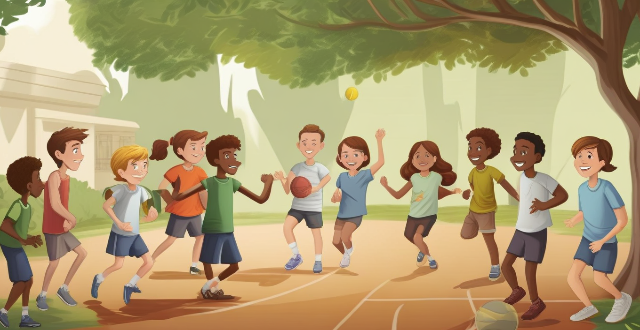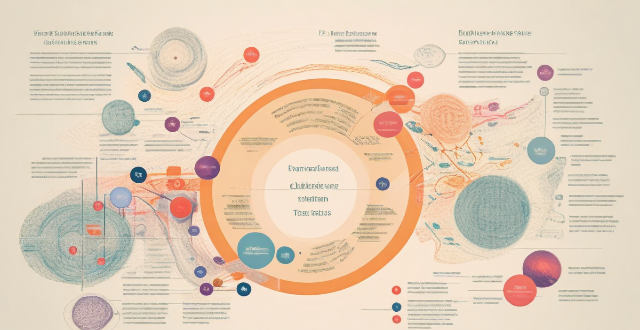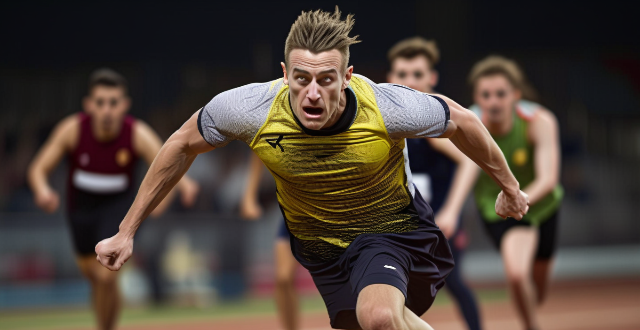Sports Positive

How can I develop a positive mindset for sports ?
Having a positive mindset is crucial for success in sports. It can help you stay motivated, overcome challenges, and achieve your goals. Here are some tips on how to develop a positive mindset for sports: - Set realistic and achievable goals, breaking them down into smaller steps and celebrating each small victory along the way. - Practice visualization techniques, picturing yourself succeeding and using positive self-talk to reinforce these images. - Focus on the process of practicing and competing, enjoying it rather than getting too caught up in winning or losing. Celebrate your improvements, even if they are small. - Surround yourself with coaches, teammates, and friends who support and encourage you, avoiding negative influences that bring you down or make you doubt your abilities. - Embrace challenges as opportunities to learn and grow, stepping outside of your comfort zone. Accept failure as a natural part of the learning process, using it as a chance to reflect, learn from your mistakes, and improve.

How can I maintain a positive attitude when facing setbacks or injuries in sports ?
In sports, maintaining positivity amidst setbacks or injuries is crucial for well-being and recovery. To foster a positive mindset, athletes should focus on the present, set realistic goals, practice self-care, surround themselves with positive influences, embrace learning opportunities, visualize success, stay active within their limits, and seek professional help if needed. This attitude helps in both physical and mental recovery.

How can I stay motivated and positive during the recovery process of a sports injury ?
Staying motivated and positive during the recovery process of a sports injury can be challenging, but it is essential for a successful comeback. Here are some tips on how to maintain your motivation and positivity: - Set realistic goals: Focus on small, achievable goals that you can accomplish daily or weekly, while keeping long-term goals in mind. - Stay positive: Use visualization techniques to imagine yourself successfully returning to your sport and performing at your best. Surround yourself with people who support and encourage you. - Stay active: Incorporate low-impact exercises into your routine, such as swimming or cycling, and attend regular physical therapy sessions to improve your strength and flexibility. - Educate yourself: Learn about your injury and the recovery process, and ask questions to your doctor or physical therapist. - Take care of your mental health: Practice mindfulness and meditation to reduce stress and anxiety, and seek professional help if needed. - Celebrate small victories: Acknowledge and celebrate progress along the way, and reward yourself for achieving short-term goals. By following these tips, you can make the most of your recovery journey and return to your sport stronger than ever.

Can sports improve academic performance in adolescents ?
Sports can positively impact academic performance in adolescents by improving physical health, mental well-being, and social skills. Studies show a positive correlation between sports participation and academic achievement, with athletes often achieving higher grades and increased college admission rates. However, individual differences and external factors must also be considered when evaluating this relationship.

How might the inclusion of sports improve social dynamics and reduce bullying in schools ?
The role of sports in improving social dynamics and reducing bullying in schools is significant. Sports encourage teamwork, collaboration, leadership skills, respect, and discipline among students. They promote empathy, understanding, and positive competition while providing a supportive community for all students. Incorporating sports into the school curriculum can create a positive environment where students can thrive both physically and mentally.

How do successful sports leaders motivate their team members ?
Successful sports leaders motivate their teams through clear objectives, positive reinforcement, encouragement, leading by example, communication, building team spirit, continuous development, resilience, and celebrating achievements.

How do I moderate interactions in a live stream to maintain a positive environment ?
The article provides a comprehensive guide for moderating interactions during a live stream to ensure a positive environment. It emphasizes setting clear guidelines, engaging with the audience, utilizing moderation tools, maintaining a professional demeanor, and encouraging positive interactions. By implementing these strategies, hosts can foster an enjoyable and respectful experience for both themselves and their viewers, contributing to the growth and health of their community.

What policies can encourage workers to shift towards climate-positive careers ?
Policies to Encourage Workers towards Climate-Positive Careers include education and training programs, financial incentives, job placement services, legislation, and public awareness campaigns. These policies aim to make climate-positive careers more accessible, incentivize workers to transition into these roles, and promote sustainability through various initiatives.

How can I make a positive impact through my travel experiences ?
How to make a positive impact through travel experiences.

What strategies can small businesses use to encourage positive product reviews ?
In the digital age, product reviews are crucial for small businesses. Here are effective strategies to encourage positive reviews: provide exceptional customer service, simplify the review process, incentivize reviews ethically, leverage social media, monitor and respond to reviews, use email marketing, and showcase reviews on your website.

What role does confidence play in developing a winning sports mindset ?
The article discusses the importance of confidence in developing a winning sports mindset, highlighting its role in allowing athletes to believe in their abilities, stay focused on their goals, overcome obstacles, and maintain a positive attitude. It also provides tips for building self-confidence through setting realistic goals, visualization, positive self-talk, seeking feedback, and thorough preparation.

How can parents create a positive learning environment through home teaching strategies ?
Creating a positive learning environment at home is crucial for children's academic success and overall well-being. Here are some strategies parents can use to foster such an atmosphere: 1. Establish a dedicated learning space that is quiet, organized, and comfortable. 2. Set clear expectations and goals with your child, and celebrate their achievements to boost confidence and motivation. 3. Foster a love for learning by encouraging curiosity, introducing new materials, and leading by example. 4. Provide support and encouragement by offering help when needed, praising effort over outcomes, and fostering a growth mindset. By implementing these strategies, parents can create a positive learning environment that encourages curiosity, exploration, and continuous growth for their children.

How does sports participation affect one's self-esteem and confidence ?
Sports participation positively affects self-esteem and confidence by providing opportunities for skill development, goal achievement, positive feedback, facing challenges, overcoming obstacles, and developing a sense of mastery.

How do female athletes use their platform to promote positive messages and inspire other women ?
Female athletes inspire and influence women of all ages by breaking stereotypes, advocating for equality, promoting health, overcoming adversity, giving back to the community, educating the youth, using social media wisely, and setting a positive example.

What are the benefits of joining a sports team as an extracurricular activity ?
Joining a sports team as an extracurricular activity can provide numerous benefits for students, including improved physical fitness and health, socialization and teamwork skills, time management and discipline, leadership and responsibility, mental health and stress relief, and the development of lifelong skills and habits. Overall, participating in sports can have a positive impact on various aspects of student life.

Can team sports contribute to mental rejuvenation more than individual sports ?
Team sports may contribute more to mental rejuvenation than individual sports due to increased social interaction, motivation, and sense of belonging. However, individual preferences vary, and some people may find greater mental rejuvenation through individual sports or other activities that bring them joy and fulfillment.

Is there a connection between sports and happiness ?
The text discusses a study that found a significant, positive connection between sports participation and individual subjective well-being. The study also found that the impact of sports participation on subjective well-being varies depending on the population being studied and that class identity and health play a mediating role in this relationship. Overall, the study highlights the importance of physical activity for improving individuals' overall well-being and suggests that national fitness and health initiatives should be promoted to improve society's overall well-being.

How does being involved in sports impact sibling relationships ?
Being involved in sports can have both positive and negative impacts on sibling relationships. Here are some ways in which sports can affect the dynamics between siblings: ### Positive Impacts: - **Teamwork**: Playing sports together can teach siblings how to work as a team, communicate effectively, and support each other. This can strengthen their bond and improve their overall relationship. - **Shared Interests**: Sports can provide a common interest for siblings, allowing them to spend time together and create shared memories. This can help build a stronger connection between them. - **Respect for Abilities**: When siblings participate in sports, they may develop respect for each other's abilities and accomplishments. This can lead to increased admiration and understanding between them. - **Goal Oriented**: Sports can teach siblings about setting and achieving goals, which can be applied to other areas of their lives. This can help them grow together and encourage each other to succeed. ### Negative Impacts: - **Competition**: While healthy competition can be beneficial, it can also lead to jealousy and resentment if one sibling feels that the other is receiving more attention or praise. This can strain their relationship and cause tension within the family. - **Pressure**: The pressure to perform well in sports can sometimes create stress and anxiety for siblings. This can lead to conflicts and disagreements, especially if one sibling feels that the other is not contributing enough effort. - **Time Management**: Sports commitments can take up a significant amount of time, leaving less opportunity for siblings to spend time together outside of their athletic pursuits. This can lead to feelings of isolation and neglect within the relationship. - **Injuries**: Injuries sustained during sports can have long-term effects on a sibling's ability to participate in activities with their siblings. This can cause frustration and disappointment, potentially damaging the bond between them. In conclusion, being involved in sports can have both positive and negative impacts on sibling relationships. It is essential for parents and coaches to encourage healthy competition, communication, and teamwork while also ensuring that siblings have ample opportunities to spend quality time together outside of their athletic pursuits. By doing so, sports can serve as a valuable tool for strengthening sibling bonds and fostering lifelong friendships.

How does participating in sports affect family relationships ?
The impact of sports participation on family relationships can be both positive and negative. Positive effects include enhanced communication, shared experiences, teaching responsibility, and promoting healthy habits. Negative effects may arise from time constraints, pressure and stress, and financial strain. To manage these challenges, families should set realistic expectations, make time for family activities, communicate openly, and manage finances wisely.

In what ways can sports psychology aid in injury rehabilitation and recovery ?
Sports psychology aids in injury rehabilitation by managing emotions, developing a positive mindset, promoting healthy habits, and helping athletes return to their previous level of performance.

What are the psychological benefits of participating in sports ?
Participating in sports can have numerous psychological benefits that extend beyond physical health. Here are some of the key advantages: - **Improved Mood and Reduced Stress**: Boosts endorphins, decreases cortisol levels, and helps to lower stress. - **Enhanced Self-Esteem and Confidence**: Achievement and mastery in sports boost self-esteem, while social interaction increases confidence. - **Better Sleep Quality**: Regular exercise leads to physical fatigue and relaxation, improving sleep patterns. - **Increased Resilience and Mental Toughness**: Overcoming adversity in sports builds resilience, while goal-oriented pursuits foster mental toughness. - **Social Support and Connection**: Teamwork and camaraderie provide a network of support, while shared experiences create bonds and friendships. - **Improved Cognitive Function**: Studies suggest regular exercise can lead to increased brain volume and improved cognitive function. - **Emotional Regulation and Coping Mechanisms**: Sports provide an outlet for expressing and managing emotions like anger or frustration, and athletes learn to cope with high-pressure situations. - **Positive Addiction and Avoidance of Unhealthy Habits**: Sports can become a positive addiction, replacing less healthy habits, and require time management, reducing idle time that could lead to unhealthy behaviors.

What are the long-term effects of youth sports on mental health ?
Youth sports can have both positive and negative effects on mental health, including increased self-esteem, improved social skills, and reduced stress levels. However, pressure to perform, overtraining, injuries, bullying, and dependence on sports for identity can also have negative impacts. It is important for adults involved in youth sports to be aware of these potential effects and take steps to foster the positive ones while mitigating any negative impacts.

What role does communication play in sports leadership ?
Communication is vital for sports leadership, helping achieveCommunication is vital for sports leadership, helping achievehesion, and foster a helping achieve success, build team cohesion, and foster a positive environment. Clear and concise messaging, active listening, encouragement, and motivation are key components of effective communication in sports leadership. Benefits of effective communication include increased performance, improved team cohesion, enhanced athlete development, and greater satisfaction and retention.

How does sports sponsorship affect the overall perception of a company or brand ?
Sports sponsorship can significantly impact the overall perception of a company or brand, both positively and negatively. Positive effects include increased brand awareness, association with positive attributes, and customer loyalty and engagement. Negative effects may arise from negative associations, costly investments, and limited target audience. Companies must carefully consider the potential benefits and risks before committing to sports sponsorships.

Can team sports help with social anxiety ?
Team sports can potentially help individuals with social anxiety by providing a supportive environment for exposure therapy, building confidence, offering positive reinforcement, distracting from self-consciousness, and developing social skills. However, professional guidance should be sought if social anxiety significantly impacts one's life.

How can I handle setbacks and injuries in my sports career ?
This article discusses strategies to handle setbacks and injuries in sports career, including staying positive, setting realistic goals, practicing visualization, following medical advice, maintaining proper nutrition, incorporating cross-training, seeking professional help, building a support network, and practicing self-care.

How does sports participation influence self-esteem in children ?
Sports participation has a positive impact on children's self-esteem by increasing physical fitness, developing skills and mastery, promoting social interaction and teamwork, and encouraging goal setting and achievement.

Can you suggest ways to combine sports and charity work effectively ?
Combining sports and charity work is an effective way to make a positive impact on society while also promoting physical activity and healthy living. By organizing charity sporting events, partnering with charities to support their mission through sports, and using sports as a platform for awareness and education about important issues, we can create a powerful force for good that benefits people in need while also fostering a sense of community and teamwork within the sports world.

How can families deal with the pressure and expectations that come with competitive sports ?
The article discusses how to manage pressure and expectations in competitive sports. It suggests setting realistic goals that focus on personal growth rather than comparing oneself to others. It also recommends encouraging a positive mindset by praising effort and improvement, emphasizing the importance of sportsmanship and fair play, teaching resilience, and modeling a positive attitude towards sports and competition. To foster a supportive environment, it suggests providing regular feedback and constructive criticism, encouraging open communication about feelings and concerns, celebrating successes, big and small, and offering emotional support during tough times. Finally, it emphasizes the importance of maintaining a balanced lifestyle that includes time for rest, relaxation, and other activities outside of sports. By implementing these strategies, families can help their athletes enjoy their sports journey while achieving personal growth and success.

How does sports sponsorship impact a brand's visibility and recognition ?
Sports sponsorship is a powerful marketing tool that enhances brand visibility and recognition. It provides increased brand exposure through prominent display, broadcasting, and media coverage. Association with positive attributes like athlete endorsements and alignment with core values improves brand appeal. Engaging target audiences through interactive experiences and social media presence further boosts brand recognition. Building loyalty and trust via community involvement and consistent association strengthens consumer relationships. Overall, sports sponsorship offers brands a unique opportunity to elevate their presence and impact their bottom line positively.